This spring, hundreds of supplier companies across North America remained open during the pandemic—many by meeting the requirements of essential businesses as they worked to produce personal protective equipment such as face masks, face shields, gowns, gloves, sanitizer and similar products for health-care workers and customers.
Although most operated with fewer employees (many working from home), limited hours and extended production times, promotional products continued to ship out—as long as distributors were placing orders.
As state shelter-in-place mandates were slowly lifted beginning in late April, companies across the industry have resumed operations, but they are returning to a much different landscape.
The pandemic and lockdown cancelled hundreds of thousands of events, upended entire industries and permanently closed some businesses. One of the hardest hit is the hospitality industry, a top buyer of promotional products, which includes hotels, airlines, meetings, conferences, tour companies and related businesses. By the end of May, the U.S. economy was expected to have lost 1.6 million jobs and $84 billion in earnings from cancelled conferences resulting in closed hotels and almost-empty planes, according to Emsi, an affiliate of Strada Education Network.
Retail, the largest business sector for promotional products, according to PPAI research, was also among the casualties suffering temporary closures resulting in huge revenue losses, particularly among furniture, home furnishings and clothing stores. The education market, also a top buyer, suffered economic losses as well with school closures and cancellations of proms, graduations and end-of-school-year events.
Even now, as businesses are reopening and people are returning to workplaces, the future is unclear and the question on everyone’s mind remains: How will our industry find its way back and when?

“Now is the time for a complete reset and for people to reimagine what their business will be,” says Jonathan Isaacson, president at supplier Gemline in Lawrence, Massachusetts. “What it was, is really not what it will be any time in the near future.” He cites events and conferences, a big piece of the industry’s business, and the fact that more people are now working from home on a long-term basis, a trend that will affect commercial real estate and related industries. If these markets go away, what will take their place? “Where are the places where we are driving value as an industry and how will that change the world that is today?” he asks.
While the sales of PPE buoyed some suppliers and distributors over the past few months, he doesn’t believe these products are a natural fit for the promo industry. “Three-ply masks without a logo, and the fact that we are buying them from the same guy in Asia from whom we buy our stress balls, is not the best possible course of action. If PPE fails, it has a much bigger implication than an issue with stress balls,” Isaacson says.
Noting that the safety of his associates is of paramount concern, he has put together a Standard of Care Advisory Committee that includes epidemiologists, microbiologists and an environmental health pro to help ensure the company is selling the best PPE possible, to provide education and best practices for the industry and to help keep his workplace safe.
As far as sales, Gemline had to shut down for a while but later reopened when it was deemed an essential business. The company added new categories to sell products such as soap and hand sanitizer and is selling kits and bundles that combine PPE with other products. By July, it will have launched additional new products and services that bring value to distributors and their end buyers. The latter is just one example of the importance of getting to market quickly.
“What has changed is the speed in which we’re implementing changes in the organization,” says Isaacson. “We’re on COVID time. If we see an opportunity, we move on it quickly.”
When asked when sales might return to pre-lockdown levels, he says Gemline wasn’t hit quite as hard as others and weathered it well, but from an industry perspective, it’s going to be a long road back. “Whole industries were decimated, and it will take a while to rebuild to where we were. We need to remember that this is a huge tragedy—especially for the people who’ve put their blood, sweat and tears into companies that are now gone—through no fault of their own. It’s an event that was out of everybody’s control, no one saw it coming. It’s a human tragedy on many levels.”
Another victim of the pandemic is the industry supply chain. “Our relationship with China has gotten a lot more tense. That’s good for nobody,” he says. “We need to find a way to engage our way through this because there is no way to easily move the supply chain out of China—you can move some, but not all of it. It’s going to be an issue for the industry and it’s very category-dependent.”
What he’s most optimistic about is the resiliency of the promo industry. “This is a very resilient industry with product that has real value. People will find a way—one way or another the business will be rebuilt. It may be different, but it will come back.”
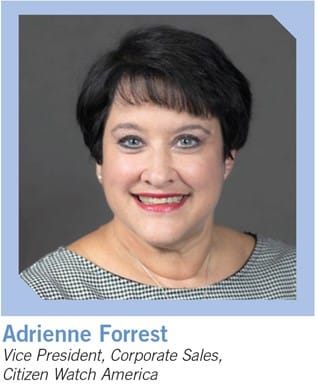
Adrienne Forrest, vice president, corporate sales for Citizen Watch America in New York City, says with its warehouse based in California, the company was unable to ship the bulk of its products for either retail or corporate use during the lockdown, but it began a soft opening in late May and is gradually shipping in larger and larger quantities to customers. Still, she says it’s unclear how the event and experiential programs will be impacted. “The next six months will be critical once companies reopen and we get a better idea of customers’ comfort levels. Customers will be relying more heavily on suppliers who have stock on the shelf since lead times overseas will be greatly impacted.”
She believes it will take a year or more to return to a semblance of normal business, but it may never rebound in full.
During the pandemic, the company implemented a restructuring strategy to “meet the challenges of the rapidly evolving watch marketplace and accelerated by the unprecedented headwinds of the COVID-19 crisis,” Forrest says. One of the changes was moving many of its executives into multi-brand positions. Forrest now oversees the entire CWA portfolio of brands within the corporate sales channel and the company is adding more resources to provide customers with the best service.
“We now offer an unparalleled selection for every market niche under one roof, while preserving the integrity and storytelling power of each brand,” she says. “We believe these fundamental changes to our company will makes us far stronger and position us as an innovator and leader in our industry.”
Paul Lage, MAS, president of IMAGEN Brands, in Mason, Ohio, parent company of suppliers Crown and Vitronic, says the pandemic and subsequent lockdown caused obvious challenges but also some positive changes that might not have otherwise been addressed. “We have learned to work from home, embraced new technologies and processes, learned about crisis management and expanded our appreciation of all our employees and business partners as this crisis continues to pull us together,” Lage says.
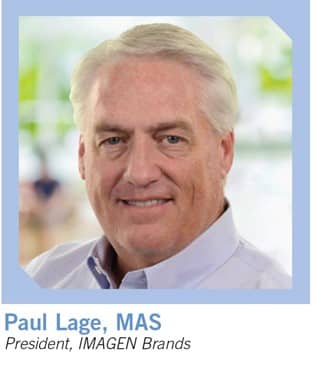
The industry supply chain is another issue, but Lage believes it’s already been impacted. “Most suppliers are pushing out inventory buys, new products are being delayed and there is little certainty that we can provide our vendors for when things will change,” he says. “Many of our products are labor intensive. These delays are not sustainable and many of our vendors are at risk of going out of business, too. As a supplier, we are trying to balance our needs with the long-term survival of our vendors.”
As far as returning to pre-lockdown levels, he’s estimating third quarter of 2021. “That’s today’s estimate. There is more risk that it will be later than this time frame versus recovering earlier.”
Still, Lage believes there’s plenty to be optimistic about. “We are learning how to do business differently; working from home will create new and different jobs for the future. Our salespeople have new tools to use in conducting virtual sales meetings and trade shows, and we are learning how to communicate differently with our own associates and partners. We will look back on this time and realize this is when our industry truly had meaningful change. We will come out of this, and those who make it will be stronger and more prepared for the future.”
The pandemic was a catalyst for change in many companies, including Lage’s. “We now have a more strategic focus on products, structure and purpose,” he says. “We need to find ways to be profitable no matter our size. We have to evaluate our relationships and create fair partnerships going forward, too. This future is not about who can supply the lowest price, as so many suppliers have been ‘flying too close to the sun’ when it comes to margins and being prepared for crises like this. If you think about the tariffs, COVID and the social unrest we are living through, it should be a reminder that we all need to work together to create a positive future for all.”
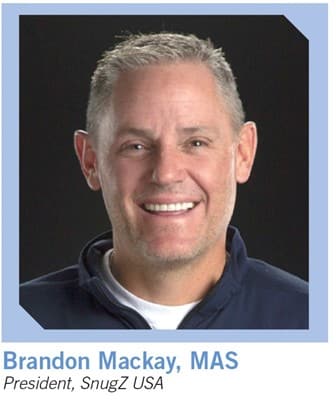
The massive job required precise teamwork, and the pandemic uncovered a number of opportunities for the team to learn what it was capable of. “First, it has put an emphasis on family-first,” says Mackay. “If that is not a cornerstone of your business, then it’s all for naught. The SnugZ USA team has rallied to help out all areas of the business not just to provide an A-plus job for our customer while dealing with mind-bending adversity, but we’ve also tried to help out with an all-hands-on-deck mentality to get people out of here to spend time with their families.” During the height of the pandemic, SnugZ was able to transition more than 75 positions to work at home to protect their safety and allow employees to care for their children who were without daycare, schools and activities. “I think this has again emphasized our SnugZ values of ‘think big, work like crazy, care passionately and do what is right,’” he says.
Now that the country is opening back up, he’s thinking about industries that are not doing so yet. “Like many promotional products suppliers and distributors, we have a weighted portion of our businesses in travel, events, conventions and meeting planning. These segments being shut off like a valve has been an extreme challenge, and many of these looking like they won’t return until 2021 has left a huge void in our business,” Mackay says. His best guess on when sales might return is fourth quarter of 2021. “Let’s be honest, this is a guess since so much is dictated by fear and testing.”
This year was a double negative one for many suppliers, Mackay says. “We had Chinese New Year followed by COVID. On top of that, when product did show up it was the wrong merchandise. We became heavily weighted in inventory that was unsellable in the short time frame due to the shift to PPE. The immediate shift to PPE left us with little to no inventory for 90 days as the supply chain caught up the best it could. Now everyone is trying to sell PPE regardless of quality and vetting of vendors. It’s unfortunate that quality and safety have taken a back seat to just shipping product.”
Despite the events of the past few months, Mackay has faith in the power of promotional products. “I’m very bullish on promo and always will be,” he says. “There is not a means of advertising and corporate branding that is equal to this industry. If we, as Americans, always believe in the American Dream of an idea leading to success and a better life, then we’ll always have an industry, and SnugZ will always have a customer to sell branded merchandise to. As I reflect over the past 90 days, I have faith in our distributor partners to make a comeback for all of us.”
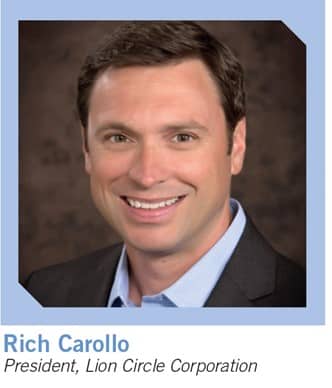
Rich Carollo, president of Chicago-based Lion Circle Corporation, says his company was deemed an essential business and remained open but sales during the first few months were down significantly. Most of the company’s products, such as hand fans, are festival- and event-driven and that segment of industry has taken a huge hit. But the nice thing, he says, is that some of his lower-profile products, such as coloring books and food packaging, have become more popular for companies sending gift packages to home-bound employees. Another bright spot, he says, is that it’s easier now to get customers on the phone. “They are willing to listen; it used to be that they were too busy,” he says.
Still, he’s concerned about his events business. “We need the events to come back. Events are pretty important for our industry,” he says, adding that parades, such as Chicago’s Gay Pride parade and 4th of July parades mean big business for Lion Circle. “Those are what we need to get going.”
Like most suppliers, he’s eager to get business back to the constant hum he enjoyed only a few months ago. “It’s going to take some time,” he says, mentioning trade shows as an example. “The way it’s going to work is you just do it. There will be lots of people, both suppliers and distributors, who don’t come to shows but if you stay back for a year, then you see people who are out living their lives and you realize you’ve missed out. It’s just a matter of when you adapt to it.”
Ten years ago, during the Great Recession, he remembers companies were peeling back their marketing budgets. “If everyone is going forward, you can’t keep walking backward or you’ll be wiped out,” he says. “We are going to figure out a way to get everything working again.” He says it’s anybody’s guess when sales will be return to pre-lockdown levels, but he’s hoping it will be Q1 of next year.
On the industry’s supply chain, Carollo considers his USA-made products a particular market advantage now. “I think there will be some hiccups in China and that will cause a positive for us. We are a decent alternative to Chinese products at a low price point in a quick turn time. I’m optimistic about that and we are getting plenty of work because of it but I think it will be another generation before anything really happens [with moving supply chains out of China],” he says, adding that where products are manufactured is not usually the first question end users ask their distributors.
Carollo is confident in the industry’s ability to bounce back and he’s eager for relationships to continue. “I hope the way the industry works, with the supplier/distributor relationship, stays the way it was, and I think it will,” he says. He thinks the industry will continue to consolidate, especially on the distributor side.
“In the past four or five years, we’ve seen investment groups buying into our industry and finally seeing how important we are. I think a lot of those ‘numbers guys’ will get really scared by what they are seeing now in our industry, but the seasoned people know where we’re at and will figure it out. I’m hoping our industry gets back to that more personal level. With a lot of people looking around and trying to find answers, there will be a lot more collaboration.”
During the first couple of weeks of the pandemic, his business went from slow to dead, he says, so he had to furlough quite a few employees but hopes to rehire them by late summer.
“This is a gut-check moment when you find out who on your team is really good and willing to work hard,” he says. “I’ve seen some surprising stars—people shining, willing to do whatever it takes to get it done. That helps me sleep at night, for sure.”
The pandemic also was a catalyst to look at his product line to see what products could be mailed and what products could make people safer. He saw a boom in his single-serving food packaging, drop-shipping requests and kitting orders, and also added face masks to the line.
“I’m also always looking for new lines and new products to add, but I’m going to loosen that up a bit more if I can find some new opportunities, some synergy with a company—I wouldn’t mind adding on to this portfolio,” Carollo adds.
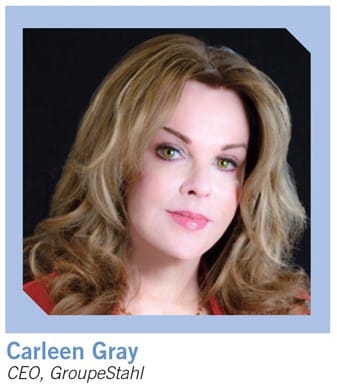
As the company, a leading provider of pre-cut and custom athletic numbers, letters and logos, equipment and related services, has resumed business, Gray is happy to report that some of Stahls’ sales are already very close to pre-lockdown levels. “We have different projections for different divisions. We also saw very clearly which segments were stable during the crisis, why, and will work to develop more market share,” she says. As far as any effect on her supply chain, she says, “We are a manufacturer, so we control much of our supply chain. However, there is no getting around certain components and key supplies. We have U.S.-based manufacturing in all key areas and redundancy in all major segments, and this helped.”
Because Stahls offers a comprehensive educational component to customers, downtime during the pandemic drew more participants. “We found, during the pandemic, that businesses wanted to listen, learn and talk. Our educational sessions were packed. We found they would invest, and new start-up business is through the roof,” Gray says. She also was surprised to see how well many business owners handled the shelter-in-place orders. “Customers who were in business simply unplugged their heat presses and took them home. The heat press gave them independence, and a way to earn a living. All segments were doing this, from promo to sports and ecommerce fulfillment. People were personalizing masks on heat presses almost immediately—something that is difficult on a screen-print press. The customer base was so thankful that we remained open to fill their orders. They told us this time and time again.”
The pandemic also gave the company time to rethink its business. “Stahls’ has been in business for 88 years and the pandemic forced our hand on changes that were long overdue, but culturally engrained,” Gray says. “On a daily basis, we realize that we can do more with less. We have streamlined and cut costs. Our executive team anticipates and makes decisions to keep the company and our people healthy and employed. We know we will be a smaller company, but we also know we are smarter, leaner, stronger.”
She is also confident about the company’s future in other areas. “We are very optimistic about new technologies we are introducing,” she says. “The pandemic made us focus on fewer projects with less distraction. We are driving these with the mentality of a start-up, make-or-break-it passion. We are introducing simpler solutions to an industry that needs clarity and simplicity and a focused way to profit.”
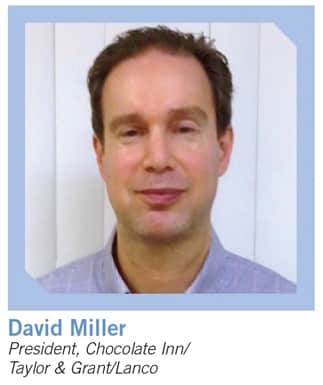
“We reinvented ourselves in being one of the top suppliers to the industry of PPE products,” he says. The pandemic also made him rethink the company’s purpose and products to focus more toward the needs of where there is a scarcity of supply.
Miller says his concern about the industry’s supply chain is about inflated product and shipping costs from overseas, but he anticipates sales will return to pre-lockdown levels by fourth quarter of this year. “We will rebound, and the pivoting of most distributors from purely promotional to being top of mind for PPE products shows the versatility and survival aspects of our marketplace in which the relationships we have developed are supreme.”
When most events and conferences came to a screeching halt this past spring, many custom orders at C. Sanders Emblem in San Fernando, California, were cancelled as well. “So many of our [end buyers] are schools, sports teams, museum gift stores, fraternal organizations and membership clubs,” says President Penny Ledbetter. “I’m confident they will all come back in time.” But COVID-19 was not the first challenge the supplier has faced in the past year. “Actually, our major issues started last September with the 15 percent tariff on top of the regular duty of 11 percent on our products coming from overseas. That 26 percent was not something we felt we could pass on to our customers. The past few months the tariff was reduced to 7.5 percent plus regular duty of 11 percent—so now we are at 18.5 percent. This has really hurt us.” In addition, she says all transport companies are now charging a surplus fee depending on weight so her cost to get products into her warehouse has risen significantly.
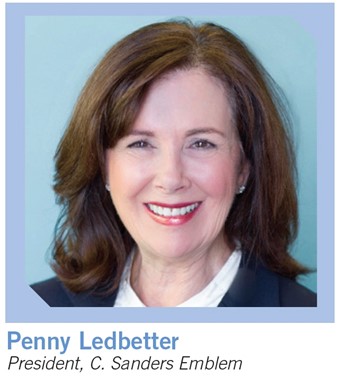
However, there has been a positive side to the pandemic. “My team—admin, sales, artists and warehouse—are much closer. Job descriptions are out the window—everyone wears several hats—and communicating and coordinating is at an all-time high. Everyone is giving their all,” she says.
Ledbetter reopened her facility in May and is worried that business will not come back to previous levels. “I worry that [end buyers] with budget constraints due to temporarily closing their business, may view my products as non-essential and not come back. “Budgets, understandably, will go to other areas of their business,” she says, adding that she did take advantage of the Paycheck Protection Program and it’s helping but she’s not sure what may happen when that runs out before her business comes back. She also had to deactivate her SAGE membership due to budget constraints and is concerned new distributors will not know about the company or know to contact it.
With fingers crossed, she says she hopes sales will be back by fourth quarter of this year but realistically, she’s anticipating 2021. “Business will trickle in but to return to previous levels …?”
The supply chain post-COVID is another concern. “Everything will take longer and be more expensive,” she says. “So far, factories have been able to import from other countries the raw materials they need for our pins: copper, iron and aluminum. I’m not experiencing any problems from overseas. My factories are up and ready to run at full capacity—they are just waiting for us to come back with orders.”
If nothing else, the pandemic taught Ledbetter and her team how to look for new opportunities. “We are looking for new customers to expand the category of clients we now service and for new ways to connect with them,” she says, adding the example of perfecting a short video introduction. “We are looking at our core values and matching them with businesses and foundations where a partnership makes sense.” She’s also using the company newsletter and social media to share what fraternal clubs her customers are using to help their communities. “These ideas will help others by giving them knowledge of how to help and how to go about organizing projects to assist others,” she says.
These exercises and working to be innovative in other ways, have helped her team to be more creative and energized by the challenges they are facing. “We have ideas for new ways of selling, new designs and products. More importantly, how to use our products in meaningful and effective ways,” she adds.
As far as what to look forward to as the industry ramps back up, she says, “Relationships and trust will be even more important between distributors and suppliers. I expect the relationship to strengthen with a greater understanding and respect for each other’s position.” She’s also optimistic about promotional products and her category specifically. “There will always be a need to deliver a message through marketing and branding, and special collections and keepsakes are important to people now more than ever, and that is so much a part of our company.”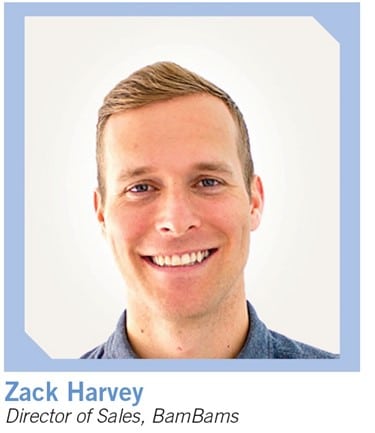
“At BamBams, a majority of our products are imported so we were faced with a large challenge entering March,” says Zack Harvey, director of sales. “As events started being cancelled and pipelines were drying up, we began working with our network of factory partners and logistics team to begin importing masks, gowns and various other PPE items that we could offer to our distributor partners.”
The company was able to remain open during the pandemic, and its U.S. production facility was fully operational while taking precautions for social distancing. Sales, accounting, design and support staff worked remotely to keep up with orders. Now as business has begun opening more fully, Harvey’s concern or challenge “is being able to fill the PPE orders in a timely manner. Everyone is concerned with the health and safety of their community and we are working with our factory partners to provide the best quality products in a reasonable time at a competitive price.”
He’s unsure when sales might return to pre-lockdown levels because of the prospect of a second wave of the virus but he’s optimistic about the health of the supply chain. “We believe the industry supply chain will recover, but that a portion of the focus will remain in importing PPE, especially protective items that can be branded. BamBams is known for providing unique and custom items to our customers, and that won’t change. However, because of our longevity and business relationships with our factory partners, we were able to quickly bring PPE to our market and we will continue to do so.”
As far as the future for BamBams and the industry, Harvey says, “While there might be a new normal, BamBams will continue to provide ‘products that excite,’ as well as grow our company based on success measured through customer satisfaction and empower our team members to grow their business partnerships.”
–––––––––––––––––––––––––––––––––––––––––––––––––––––––––––
Tina Berres Filipski is editor of PPB.


